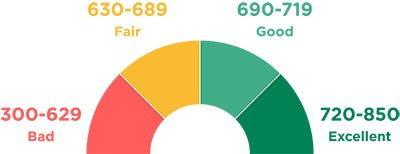Why Your FICO Credit Score Matters (even if you never take out a loan)
Your credit score and FICO can affect many aspects of your financial life, even if you never take out a loan. Find out why your FICO is so important.
Originally published 7/24/21.
I’m sure you’ve heard that your credit score is really important, and you might mistakenly think that it’s only important if you’re opening up new lines of credit or getting a loan. In reality, your credit history and FICO score can impact everything from your utility bills to your job.
One of my dance teachers is notoriously a “hot mess.” I’ll admit that I don’t actually know the meaning of that phrase, but it conjures images of someone who appears to have their shit together and actually fails miserably.
My teacher was complaining one day about her Comcast bill, and she said someone had told her to stop paying the bill for a couple of months and then renegotiate with Comcast. Another student and I stared wide-eyed and told her this was a terrible idea. I said it would ruin her credit.
She replied, “What credit?”
Whether or not your credit is currently in the toilet, you should still take action to keep it in good shape. There are many reasons you need good credit, even if you don’t plan to take out any loans or use credit cards.
Utility companies can charge more
Anytime I have moved and set up utility services, I’ve been told that my credit would be checked. Utility companies can charge you a higher setup fee if your credit is shit. If you have bad credit, you tend to pay more for anything involving a credit check. And if you have bad credit, you probably can’t afford to pay more.
Keeping your credit in good standing can go a long way to save you money.
Additionally, some utility companies will report your late or unpaid bills to the credit bureaus. They usually don’t report good payment history because it’s such a burden. Revolving payments that don’t involve much credit worthiness such as utilities and rent payments aren’t often reported to the bureaus, though there has been some talk in Washington to change that to improve the credit worthiness of people who don’t use credit cards.
Your insurance rates are dependent on your credit history
Some people don’t understand why insurance companies would charge more just because your credit is bad. Corporations and lenders tend to think that people with poor credit scores are more irresponsible with money. In many cases, people go into credit card debt shopping, and that lowers their score.
Of course, you can also ruin your credit if you go into medical debt, but few would argue that this is the consumer’s fault as much as credit card debt is.
You may be denied internet, TV, or phone service altogether
While I’d argue that internet and cell phone service is just as important as the electricity, gas, and water utilities that provide services that you need to survive, they’re not yet classified as such. Because of this, there’s really no obligation at all for them to provide service, even at a higher cost to you.
You’ll never find a good job with poor credit
Whether it’s fair or not, employers think that people with bad credit are irresponsible. They’ve increasingly begun checking credit histories before they offer jobs, and if yours has something they don’t like, they’re not going to offer you a job.
This goes back to my earlier comment that corporations think people with bad credit are irresponsible. I find it funny sometimes because I used to work for a company that paid its contractors very late, if at all. If companies and individuals were scored the same, I’d probably have been 300 points higher than my former employer.
Are people with bad credit less financially responsible?
I couldn’t find any articles pointing to a study indicating whether or not people with bad credit are more financially irresponsible than those with good credit. I will give you a little anecdotal evidence, which my scientist husband hates because it’s only based on one person’s personal experience and isn’t scientific by a longshot.
When I ran applications for apartment rentals and had access to people’s credit reports, by and large, those with poor credit paid rent late or skipped out on their lease.
I don’t inherently think that people with bad credit are irresponsible. I think that they haven’t learned the best practices for managing their finances (which is why I’m here) and that in most cases, if they understood what paying the minimum balance on a credit card actually meant, they would have a better FICO.
There is some evidence showing that people will blame others for being poor (even if they themselves are poor) but will attribute their own poor status to a misfortune of some kind. So, with that in mind, we can understand why a corporation might think that people with bad credit are inherently bad with money. It’s always someone else’s fault they’re poor but never our own fault we’re poor.
Your credit history and FICO score affect a lot, even if you’re not planning to take out any loans or use credit cards. Next time you’re in a shitty place financially, please remember this and don’t make a rash decision because you think “it can’t get any worse.”





